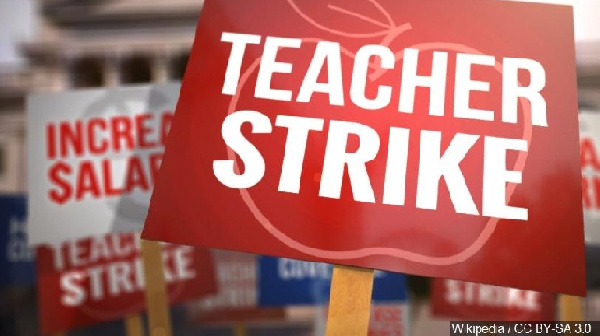Members of the University Teachers Association of Ghana (UTAG) are yet to decide whether to end a nationwide strike after an intervention by the National Labour Commission (NLC).
UTAG announced an industrial action over conditions of service on Monday, 10 January 2022, compelling a meeting between parties involved.
In a letter dated 8 January, UTAG called on their employer “to restore members to the 2013 Interim Market Premium (IMP) of 114% of Basic Salary in the interim whilst government goes ahead to formulate guidelines to implement the appropriate recommendations to address the conditions of service of the university teacher”.
The 2012 conditions of service pegged the basic and market premium of a lecturer at $2,084.42. But the lecturers said they didn’t receive what had been agreed.
After considerations on Thursday, 13 January, the NLC directed UTAG to call off its industrial action and resume work because they did not follow due process to channel their grievances.
The NLC stated that the reason UTAG embarked on the strike had been settled, thus submission of the report on the Labour Market Survey.
NLC added that UTAG might have other issues, “but those had not yet been formally presented to the employer for redress”.
At the meeting, the government was represented by the Minister of Employment and Labour Relation and his Deputy, Deputy Minister of Finance, the Chief Executive of Fair Wages and Salaries Commission (FWSC), the Director-General of Ghana Tertiary Education Commission, and UTAG, represented by its president and some executives.
However, the national president of UTAG, Dr Solomon Nunoo, has said the way forward would be determined after a meeting on Sunday.
Lecturers have remained outside the lecture rooms and have boycotted all teaching-related activities in the 16 institutions across the country.
“We are aware of the NLC’s declaration that the strike is illegal. We need to inform the people concerned. We need to quickly get all the people involved so that we can make progress.”
“We will meet all the groups between today and tomorrow, and so hopefully by Sunday, we will have gathered the views of all stakeholders. Once we do this, we can make a decision,” he told Accra-based Citi FM.
Reason for the strike
Teachers have embarked on countless strikes over the same issue in recent years.
The latest decision was made by the National Executive Committee (NEC) of UTAG following two emergency meetings.
UTAG explained that after the implementation of the IMP in 2013, a determination is yet to be made, resulting in the erosion of the university teacher’s salary.
“There was the hope that by completing and implementing the Labour Market Survey (LMS) Report of 2019, a review of the IMP would have put the University Teacher on a relatively good salary stead. Regrettably, the recommendations of the 2019 LMS Report without any accompanying technical report on the implementable MP is meaningless to UTAG as it does not address the pertinent issues of improved CoS,” UTAG lamented.
It added that there was a LMS in 2014 whose Report did not see the light of day, and one wonders if the 2019 LMS Report would ever be implemented since it is already two years old.
“In addition, recommendation (iii) from the 2019 LMS Report states that, ‘Public Services Commission should liaise with educational institutions to prioritise the offering of courses in areas of demand to increase the employment prospects of their graduates and increase the pool of applicants for high vacancies’”.
“How can such a national agenda be attained if the CoS of the University Teacher keeps worsening year on year, leading to an ever-increasing attrition rate on our campuses? UTAG members see the timing of the release of the report as one of the usual delay tactics that the Employer has employed over the years, which is unacceptable”.
“We must also point out that, generally, our members have decried the pittance agreed to be paid as annual research allowance and would want the government to reconsider the payment of a more realistic research allowance as this is critical to our research output, promotion and ultimately national development,” it added.



